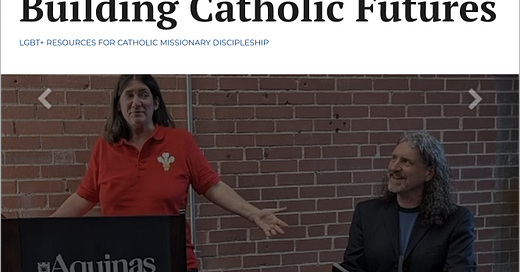Eve Tushnet has been a guest on the Pope Francis Generation podcast two different times. Once to talk about her wonderful book Tenderness and another time to discuss Fiducia Supplicans (the DDF document that gave ministers permission to bless same-sex couples). Today I wanted to encourage you to check out her newest project, Building Catholic Futures.
I first heard of Building Catholic Futures (BCF) a year or two ago when Eve launched a Kickstarter campaign for it. This project squarely rests in this “third space” in the Church, trying to take seriously the difficulties that LGBTQ Catholics face along with trying to be faithful to the Church’s teaching.
In short, BCF creates resources for parents, educators, and ministers to help them minister to LGBTQ Catholics (especially students), showing them that they have a place, a vocation, in the Church.
In a recent interview with Grant Hartley about BCF, Eve said:
“BCF was built on the knowledge that queer people are flourishing, and have flourished, in practicing their Catholic faith. We’ve brought together the elements of Scripture, Catholic theology, the lives of the saints, and contemporary Catholic biography that have inspired queer people.
BCF focuses on vocation, on the questions which have increasingly come to the fore as queer Christians speak for ourselves: How am I called to love? Where am I able to take the next step toward Jesus? Catholic outreach to LGBT+ people often focuses on sexual morality or social justice. Both of these are a part of our faith. Chastity is a part of our call to follow Jesus, and so is working for justice. But they’re only parts of a whole life. If Jesus liberates from sin and oppression, what are we being freed for?
And BCF focuses on the people who form and guide queer people’s faith. We do that because we asked queer people what helped them find peace in the practice of the Catholic faith. Over and over, we heard that just one person can make a difference: one parent, one priest, one teacher, one role model. If we want Catholic communities where gay people’s flourishing is not exceptional, but expected, we’ve got to serve the educators: the people who first open the possibility of faith.”
And in a recent article about BCF, Eve wrote:
“No matter what your own orientation is, if you’re out there in the Church today then you have probably encountered people with questions about how the Church relates to LGBT+ people. Our job is to help people enter those conversations from a new set of assumptions:
Assume that gay people can and do flourish as Catholics.
Assume that the Church has holistic wisdom that can shape lives toward love, not isolation.
Assume that Jesus liberates LGBT+ people not just from sin, and not just from oppression, but for integrity and for mission: bringing one’s whole self to be known by the Church, and knowing and sharing the joy of the Gospel.
These assumptions can’t just be asserted. They have to be grounded in realistic understanding of gay people’s spiritual journeys, and familiarity with the stories that inspire queer people: stories from Scripture, from the life of Jesus and the lives of the saints, from history and from contemporary biography—and from the people around you.”
I’m excited about this project and the work that Eve is doing in the Church. I encourage you to read those articles and to check out Building Catholic Futures




